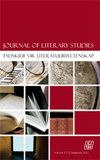津巴布韦的文学与Covid-19之战:Flight Mlambo的数字诗歌研究
IF 0.1
4区 文学
0 LITERARY THEORY & CRITICISM
引用次数: 0
摘要
本文评价了数字文学在抗击新型冠状病毒传染斗争中的贡献,重点是鲁法罗·姆兰博的《钦道》诗歌和英语表达。自2019年11月该疾病在中国湖北省武汉市暴发并于2020年3月11日被世界卫生组织宣布为大流行以来,在全球、区域、国家和机构各级开展了各种防治该疾病的努力。在这场斗争中,值得注意的是利用网络空间来补充其他非数字战线,以对抗这种看似难以捉摸的病原体。文字、录音、歌曲、戏剧和诗歌视频等多种艺术形式在网上发布,作为抗疫武器。采用“存在即战争”的理论,姆兰博的诗是在这样的背景下进行评价的,在这种背景下,抑制病毒的努力在理论上被解释为真正的战争。战争的对手一方是政府和所有地方、地区和国际合作伙伴,另一方是病毒、怀疑论者和否认者。这篇文章试图回答以下问题:津巴布韦的抗covid -19数字文献在多大程度上成为对抗顽固变异的致命病毒的有效武器?opsomingerdie文章评比师die by van数字文献中的die strd, teen die nuk, die冠状病毒,die焦点,Flight Rufaro Mlambo, dikuns van ChiNdau和Engelse uitdrukking。2019年11月,中国武汉疫情防控中心在湖北省武汉市武汉市设立,中国武汉疫情防控中心(WGO)将2020年11月列为“全球疫情防控中心”,全球疫情防控中心、全国疫情防控中心、全国疫情防控中心、全国疫情防控中心、全国疫情防控中心、全国疫情防控中心、全国疫情防控中心、全国疫情防控中心。“Die gebruik van Die kuberruimte”,“Die gebruik van Die kuberruimte”,“Die gebruik van Die kuberruimte”,“Die gebruik van kuberruimte”,“Die gebruik van kuberruimte”,“Die gebruik van kuberruimte”。Geskrewe tekste, oudio-opnames, liedjies, drama-甚至是versvideo,这是一种流行的流行语言,是一种流行的语言,是一种流行的语言,是一种青少年Covid-19。“bestaan-as- orloge”是一个单词,它来自拉姆博语,poësie是评估者的意思,而“Die hand”则是指评估者的意思,而“Die”是指评估者的意思,而“Die”是指病毒的意思,“Die”是指醉酒的人的意思,“Die”是指工作的人的意思geïnterpreteer。死oorlog se antagoniste durf regerings en阿莱plaaslike, streeks - en internasionale河畔vennote河畔甚至康德死亡,在死亡病毒,河畔skeptici en ontkenners死康德还多。在津巴布韦的水伴侣中,数字文献将青少年Covid-19视为青少年之间的一种疾病,青少年死于类似病毒的疾病是什么?本文章由计算机程序翻译,如有差异,请以英文原文为准。
Literature and the Battle against Covid-19 in Zimbabwe: A Study of Flight Mlambo’s Digital Verse
This article evaluates the contribution of digital literature in the struggle against the novel coronavirus contagion, focusing on Flight Rufaro Mlambo’s poetry of ChiNdau and English expression. Since the outbreak of the disease in Wuhan City, Hubei Province, China, in November 2019, and its declaration as a pandemic by the World Health Organization on 11 March 2020, various efforts to combat the disease have been implemented at global, regional, national and institutional levels. Notable in this struggle has been the use of cyberspace to complement other non-digital fronts in fighting the seemingly elusive pathogen. Written texts, audio recordings, songs, drama and verse videos are among the multiple artistic forms posted online as anti-Covid-19 weaponry. Employing the “existence-as-war” theory, Mlambo’s verse is evaluated against this context in which the efforts to suppress the virus are theoretically interpreted in real war terms. The war’s antagonists pit governments and all local, regional and international partners on one hand and the virus, sceptics and denialists on the other. The article seeks to answer the following question: To what extent does Zimbabwe’s anti-Covid-19 digital literature serve as effective weaponry against the stubbornly mutating lethal virus?
Opsomming
Hierdie artikel evalueer die bydrae van digitale literatuur in die stryd teen die nuwe aansteeklike siekte, die coronavirus, met die fokus op Flight Rufaro Mlambo se digkuns van ChiNdau en Engelse uitdrukking. Sedert die siekte in November 2019 in die stad Wuhan in die Hubei-provinsie van China uitgebreek het, en die Wêreldgesondheidsorganisasie (WGO) dit op 11 Maart 2020 as ’n pandemie verklaar het, word verskeie pogings op globale, streeks-, nasionale en institusionele vlakke aangewend om die siekte hok te slaan. Die gebruik van die kuberruimte om ander, nie-digitale fronte aan te vul om hierdie skynbaar ontwykende patogeen te beveg, is opvallend. Geskrewe tekste, oudio-opnames, liedjies, drama- en versvideo’s is van die vele kunsvorme wat aanlyn geplaas word as wapens teen Covid-19. Die “bestaan-as-oorlog”-teorie word toegepas om Mlambo se poësie te evalueer aan die hand van hierdie konteks waarbinne die pogings om die virus te onderdruk, teoreties geïnterpreteer word in werklike oorlogsterme. Die oorlog se antagoniste durf regerings en alle plaaslike, streeks- en internasionale vennote aan die een kant aan, en die virus, skeptici en ontkenners aan die ander kant. Die artikel poog om die volgende vraag te beantwoord: In watter mate dien Zimbabwe se digitale literatuur teen Covid-19 as doeltreffende bewapening teen die dodelike virus wat onversetlik muteer?
求助全文
通过发布文献求助,成功后即可免费获取论文全文。
去求助
来源期刊

Journal of Literary Studies
Multiple-
CiteScore
0.50
自引率
0.00%
发文量
0
期刊介绍:
The Journal of Literary Studies publishes and globally disseminates original and cutting-edge research informed by Literary and Cultural Theory. The Journal is an independent quarterly publication owned and published by the South African Literary Society in partnership with Unisa Press and Taylor & Francis. It is housed and produced in the division Theory of Literature at the University of South Africa and is accredited and subsidised by the South African Department of Higher Education and Training. The aim of the journal is to publish articles and full-length review essays informed by Literary Theory in the General Literary Theory subject area and mostly covering Formalism, New Criticism, Semiotics, Structuralism, Marxism, Poststructuralism, Psychoanalysis, Gender studies, New Historicism, Ecocriticism, Animal Studies, Reception Theory, Comparative Literature, Narrative Theory, Drama Theory, Poetry Theory, and Biography and Autobiography.
 求助内容:
求助内容: 应助结果提醒方式:
应助结果提醒方式:


